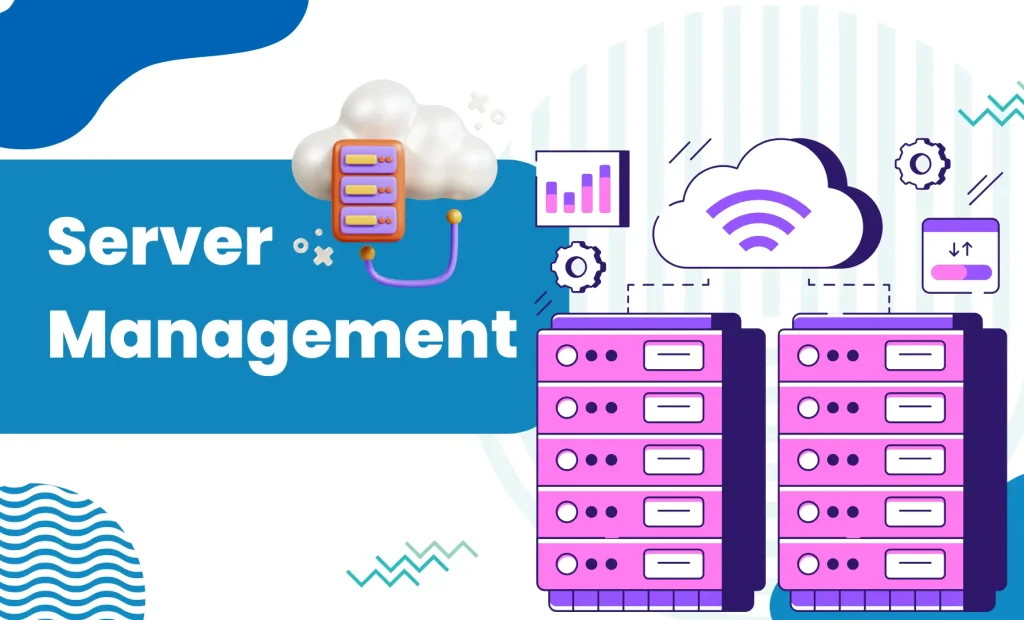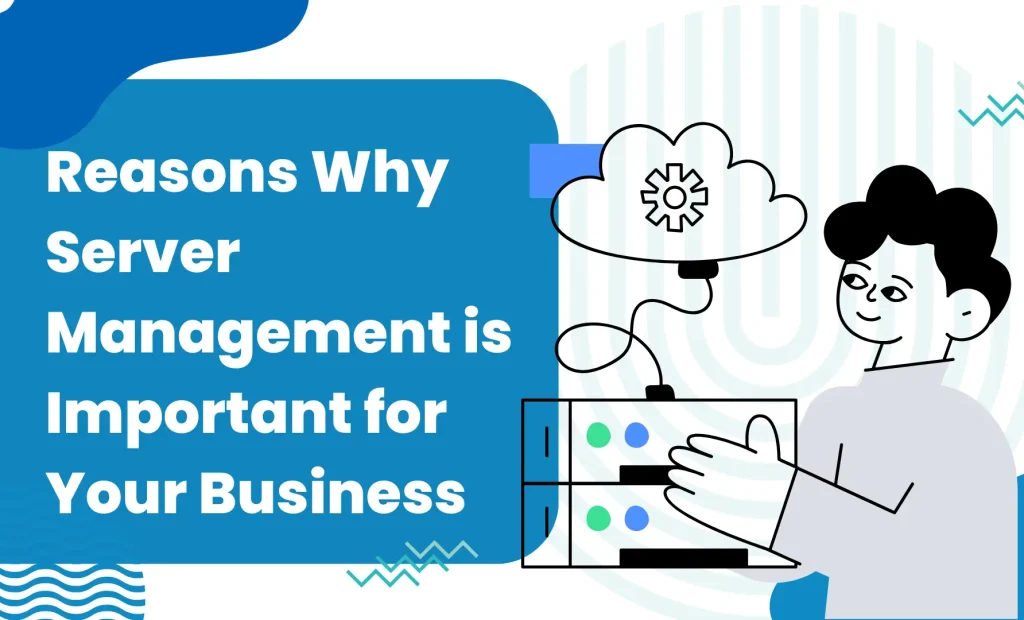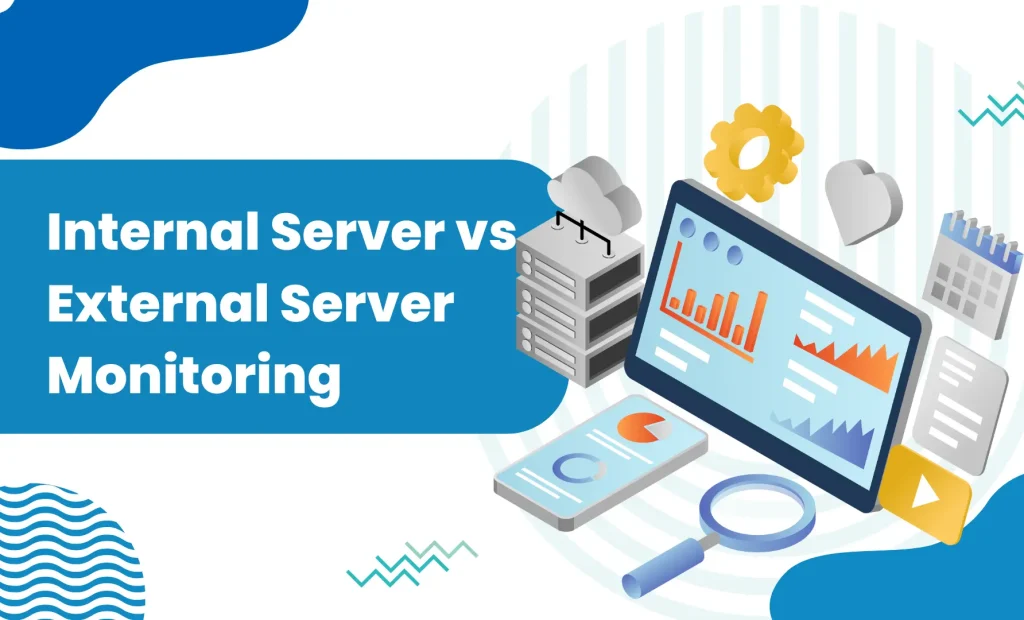
Effective server management, support, and maintenance services may make your life easier and your normal activities run more smoothly. The services provided by server management service providers keep your web server in good working order. Effective server administration is critical, yet many businesses fail to achieve its full potential.
That is a major blunder that must be avoided at all costs. The server’s default settings are insufficient in the long run, thus outsourcing server administration to a professional server management business is critical.
In this post, we’ll look at how important server management is for organizations. But, before we go into the specifics, let us first grasp the core notion of server administration and how it benefits enterprises.
Table of Contents
ToggleWhat is Server Management?

Server management is simply the upkeep of the web servers that power your website. Server administration entails maintaining and monitoring server infrastructure in order to ensure top performance.
Server management methods also involve managing hardware and software, identifying problems and implementing backups, assessing problems, and implementing appropriate security measures.
The fundamental objective of effective server management encompasses:
● Creating a secure server environment.
● Mitigating the possibility of server slowdowns and downtime.
● Continuous server monitoring and upgrades to adjust it according to the evolving needs of an organization.
Nonetheless, failing to pay attention to effective server maintenance might have major effects. It might set off a chain reaction of problems, such as data loss or theft.
These concerns might cause significant disruption to your organization. According to the survey, 94% of organizations that experience data loss fail to recover.
Types of Servers
There are different types of servers according to requirements, these include:
- Application Servers
- Physical Servers
- Web Servers
- Back-up Servers
- File Servers
- Data Servers
- Virtual Servers
The servers described above are either Linux or Windows-based. Both physical and virtual servers require server administration and support to function optimally.
Pick a Smart Option for the proper functioning of servers
Effective management of a server begins with delegating the duty to a specialized technical team capable of monitoring the server for technical flaws and promptly diagnosing them if any arise. Server management services aim to reduce downtime to zero.
Aside from that, server administration procedures comprise offering ongoing server updates for performance enhancement.
Servers provide more than just database storage; they also play an important role in controlling various company activities. Furthermore, it is in charge of gathering all IT requirements and directions in order to promote improved company running and increased coordination at all points of the organization.
A server’s failure owing to configuration disturbance, output disorder, or any other reason might result in considerable data loss. This might bring your entire operation to a standstill.
Data losses caused by non-functional server difficulties are disastrous for any firm since they need significant time and cost, which is unacceptable in today’s fast-paced corporate environment.
Although this is reason for concern, consulting with technical specialists may greatly ease server maintenance. As a result, most businesses contemplate outsourcing server management to reputable server management and support service providers.
Dedicated server management companies provide high-quality professional services at reasonable pricing.
Reasons Why Server Management is Important for Your Business

Not many organizations can afford to keep up with all of the current server industry innovations. This is when the firms that provide these services come in handy. They are well-versed in the industry’s know-how and can therefore handle the assignment effectively. As a result, by utilizing their services, you will be able to thrive in your company field.
Reasons Why Dedicated Server Management Services Are Important For Your Business
1. Server monitoring
Taking care of the server entails keeping an eye on it throughout the day, and the process begins with server monitoring. Server monitoring is the process of tracking and evaluating critical parameters that affect your server’s performance.
Continuous monitoring allows your company to operate at peak efficiency. It also alerts you to potential problems ahead of time, allowing you to avoid negative consequences to your company’s real-time performance.
Another advantage of server monitoring is that it gives a full view of your company’s IT infrastructure, which may aid in the development of future business expansion initiatives. As a result, having an active server management staff for server monitoring is critical.
2. Server maintenance
A lack of server maintenance is likely to cause problems with your company’s performance. To maintain optimal server performance, server management firms execute frequent audits, software upgrades, backups, security checks, and restoration operations. While the server software, preventative measures, and security features necessitate regular upgrades, your firm may be unaware of them.
You will need devoted specialists to work 24 hours a day, seven days a week. Furthermore, your server is likely to encounter day-to-day issues that necessitate regular adjustments in server settings. Help from server management specialists is recommended for making the finest modifications feasible.
3. Custom server setup
As previously said, several types of servers exist based on the need. A WordPress blog requires a very different server configuration than an e-commerce website. As a result, the configuration of your service is determined by your business requirements.
Server management specialists do an in-depth examination of your company hosting and server requirements to identify appropriate server settings and specifications tailored to your industry.
For the first server setup, tried-and-true industry configuration practices are used. This is done to ensure maximum server performance while reducing the likelihood of cyber-attacks and vulnerabilities.
4. Server stability
Server stability is determined by a variety of elements such as load times, server software, speed, service uptime, and so on. Even little changes in server setup might degrade overall server performance. As a result, it is preferable to obtain expert assistance with server performance tweaking.
To avoid escalating disputes and downtime, dedicated server pros run your server entirely and give server software upgrades on a regular basis. In addition, they examine and re-optimize other server performance aspects such as database latency and page load times.
5. Backups
Situations involving data loss may be devastating. They might do significant damage to your company. According to one survey, 60 percent of small enterprises that suffer data loss fail within six months. As a result, keeping data backups is crucial for your company.
Because problems are inescapable, it is best to prepare for such unforeseen circumstances. Hire a server management provider to look after your data’s safety and security. Server management pros provide you peace of mind by making frequent data backups.
So, even if your server is no longer operational, you still have access to your data.
6. Up-time assurance
Every online business must have continuous uptime. If a server cannot guarantee uptime during peak service hours, you will most certainly lose clients. This decrease in uptime puts your organization at danger, therefore you need experienced server administration to handle it.
Effective server administration can keep your servers running 100% of the time, ensuring that your services are always available. This is feasible due to round-the-clock server administration and support.
Server management businesses do the job properly and give you with help 24 hours a day, seven days a week.
Internal Server vs External Server Monitoring

Any company that wants effective server management first needs to decide whether they can manage servers internally or need to outsource the task to an external management company or else need a combination of both.
If your company has a good number of technical professionals, then managing your own servers is preferable. This way you will have access to your entire server environment. But to ensure your internal server management team works to its maximum efficiency, they need to have access to the right server monitoring tools.
There are several server management tools in the market that come with varied management options to keep your server operating at its best. Ranging from simple options like performance tracking to sophisticated ones like workflow management, there is a range of server monitoring tools to fit your company’s needs.
How to Choose the Best Server Management Tool
Confused about which server administration program to use? Begin your investigation by looking for software that provides both operating system and IT infrastructure monitoring. Next, consider the following two critical questions:
- Is your server administration software capable of providing all-in-one monitoring? A good server management software should allow you to monitor applications, systems, and any existing or future “Anything as a service” Xaas services.
- Is the software capable of performing analytics functions like diagnosing root causes of server issues?
With answers to these questions, you can find software that can meet your organization’s current as well as future needs.

What are the key components of effective server management?
Effective server management involves various components, including:
Monitoring and Performance Optimization: Continuous monitoring of server performance, resource usage, and network traffic to identify bottlenecks, optimize configurations, and ensure optimal server performance.
Security Management: Implementing robust security measures, including firewalls, access controls, intrusion detection systems, and regular security updates, to protect servers from cyber threats and data breaches.
Backup and Disaster Recovery: Regularly backing up server data and implementing disaster recovery plans to ensure data integrity and quick recovery in the event of hardware failures, natural disasters, or other unforeseen circumstances.
Patch Management: Regularly applying software updates, security patches, and bug fixes to keep servers up to-date and protected against vulnerabilities.
Capacity Planning: Analyzing server usage patterns, forecasting future demands, and scaling server resources accordingly to ensure optimal performance and accommodate business growth.
Proactive Maintenance: Regular hardware and software maintenance, including hardware inspections, firmware updates, disk defragmentation, and performance tuning, to prevent potential issues and ensure server reliability.
What Are the Risks of Poor Server Management?
Poor server management can lead to various risks and consequences:
Downtime and Productivity Loss: Inadequate maintenance and monitoring can result in unexpected server failures and extended downtime, leading to productivity loss, disrupted operations, and dissatisfied users or customers.
Data Breaches and Security Threats: Servers with outdated security measures or misconfigurations can become vulnerable to cyber attacks, data breaches, and unauthorized access, potentially compromising sensitive information and damaging reputation.
Inefficient Resource Utilization: Lack of proper management may lead to inefficient resource allocation, such as underutilized servers or overloaded systems, resulting in wasted resources and unnecessary costs.
Compliance Violations: Poor server management practices can lead to non-compliance with industry regulations and data protection laws, resulting in legal consequences and financial penalties.
Lack of Scalability: Inadequate planning and management can hinder the ability to scale server infrastructure to meet growing business needs, causing performance issues and limiting potential expansion.

Server Management is a Necessity Today
IT server management is becoming a must-have skill. Effective server administration procedures guarantee that your IT systems operate at peak efficiency. They guarantee server security, uptime, and rapid remedies in the event of an issue. As a result, good server administration may assist you in addressing any server performance inefficiencies.
The most significant factor to consider is hiring competent server management services.
As a result, always rely on a reputable Server Management Company. These firms’ server administration professionals are knowledgeable and can address problems before they harm your clients. Furthermore, they advise you on preventative measures to avoid viruses, malware, and other security breaches.